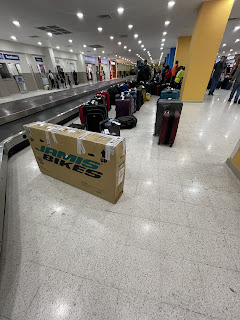I
arrived at the Belize airport. The plane was corralled through multiple
consecutive lines to get through customs - covid form intake,
declarations pre-approval, passport control, luggage pickup, customs
declarations. It seemed like I was encountering different people in each
line, as if it were a completely different line each time we all passed
through the same bottleneck.
I was informed that I had to declare my bicycle, especially because I am planning on exiting the country with it at a different port of entry. The customs officer wrote my bike’s name and model into my passport so the other border officers will know that I came with it. Legit and very official evidence of the start of this tour!
My stamped passport, confirming that I arrived with my bike
I assembled my bike in the transit center, where it seemed that most tourists were getting onto connecting flights to the islands. In fact, most sea activities like snorkeling and scuba diving originate from these islands and seem to be a bit separate from the “mainland”. I got several lookers on - both from the airport staff and other passengers.
Everything out of the box
Fortunately, there were no issues with my bike or anything that I had brought with me. It took me about an hour to assemble the bike and sort out my things - I would have to repack at the hotel.
Then I took off from the airport and rode into the city - about 10 miles. You can see the Stage 0 map on Strava in the widget on the left hand side.
The ride was very different to all of my training out in Colorado. Tropical feel, humid, flecks of warm rain coming down from the sky. Travelers palms and coconut trees were lining the roadway at times, other times a river winded it’s way next to the road until it turned out into the ocean. There were many unfamiliar bird sounds. Bright and colorful whistles coming from inside these groves of trees.
I arrived at the hotel, showered and washed my clothes and got meandered off to a place called Midtown.
View of Midtown from around the bay.
It’s a boardwalk along the sea with various food kiosks and benches where people sit and hang out, listen to music on their phones and relax after working all week. There are some hotels, casinos and restaurants on the other side of the street. I didn’t have any cash and didn’t know where the ATM was. So I got in a cab and asked if he could take me to an ATM. Right after that, three other people got in the cab and asked to go to some hotel downtown. They spoke in what he calls a “creole” form of English. The negotiation itself was very laid back and reminded me of Burna Boy’s banter on his track “
Wetin Man Go Do”. The cabbie decided he would take them first and dropped them off at the Radisson Hotel - a fashionable bar and lounge. He took me to his bank, but it was a state bank and my credit card didn’t work there. But the second, larger “Atlantic” bank took my card. After that, the taxi driver was telling me his hustles. He can arrange transportation for tours like cave tubing, visits to see monkeys in the jungle, snorkeling tours, etc. Then he will drive you to any inland location you need to go. I think many taxi drivers offer these services. He also wanted to sell me a very small nugget of weed and “funto”, a type of pressed tobacco leaf that they use to roll joints. I asked him how he did it with this rolled up ball of tobacco lead he was showing me. So he showed me by rolling up a joint - then we blazed a bit in his cab. He told me if I wanted to book any trips where I could find him, and I got out and walked through the food kiosks and first stopped to get a virgin mango colada from a slushy stand.

Mango colada with the slushy stand in the back
Oh my. After over 30 hours of sitting in planes and airports, then having my first humid ride in years, this really hit the spot.
I walked around a bit more before settling on a burrito with avocado sauce and sat and talked with Gabriel, a 22-year old who gave me a little bit of a Belizean geography lesson. He is from a village a bit north of the city, but stays with a friend and his family while working at a supermarket in the city. Most of his housemates also came from outside the city to find work. He said the boardwalk is mostly dead during the week, but people come to hang out together on the weekends and enjoy some R&R. The vibe reminded me a little bit of the “Bord de la mer” in Mahajanga, Madagascar, where we would go walk, find friends, hang out and eat brochettes.
The ocean-side pace is relaxing and has been a great introduction to the country. People are open and friendly. So far, they have been eager to share about their culture, their origins and their human experience with me.









Comments
Post a Comment